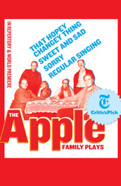Jay O. Sanders & Maryann Plunkett Chart the Amazing History of Richard Nelson’s Four-Part ‘Apple Family Plays’
Playwright Richard Nelson is entering the final stage of a four-part theatrical event at the Public Theater with the premiere of Regular Singing, which will open on November 22 (after a week of previews) on the very night in which the action takes place, the 50th anniversary of John F. Kennedy’s assassination. Nelson began his grand experiment with That Hopey Changey Thing, set on November 2, 2010, the evening of America's midterm elections, then added Sweet and Sad, set on September 11, 2011, and Sorry, set on Election Day 2012. The plays center on Apple family, four middle-aged siblings who gather around a kitchen table in Rhineback, NY, to talk about politics, life and love. Broadway.com recently chatted with Maryann Plunkett and Jay O. Sanders, who play sister and brother Barbara and Richard Apple in all four plays—and who are husband and wife in real life. Below, they explain how That Hopey Changey Thing transcended Nelson’s original notion of a presenting “a disposable play” and instead launched one of the most rewarding experiences of their long and distinguished careers.
JAY O. SANDERS: When we began working on That Hopey Changey Thing almost four years ago, Richard Nelson called it “a disposable play.” His goal was to test the effect of these characters—the members of the Apple family—being in the room with an audience, talking about exactly what was on every person’s mind at that exact moment. When you’re writing and performing something so topical, you can’t predict how it will be seen as a history play. As it turned out, Richard’s plays have become the opposite of disposable.
MARYANN PLUNKETT: Audiences have described the experience as feeling like they’re eavesdropping on us. You come into the home of Barbara Apple for an hour and a half on a particular day and overhear the ups and downs in this family’s life. We recently finished a weeklong run of Hopey Changey, and even though it’s now a history play, it’s sad how little has changed in three years. We even talk about health care, [with the line] “Don’t get me started on that Rube Goldberg mess.” And yet the script is exactly as it was written three years ago.
SANDERS: I think Richard is trying to bring us to the absolute root of what theater is. He is exploring what is deepest in our humanity through putting the most real, recognizable, restless people he can—a family—in front of us. The action of the play stems from the chemistry of the actors with one another and with the audience, and that has deepened over time.
PLUNKETT: The reaction to the first play was wonderful, and I was thrilled when I knew that there was going to be another one, and then another one, and now another one. Although each play is about a particular day [with political or historical significance], I think Richard realized that it’s about this family, too—with scenes that are not headline-making to anyone outside the walls of the house. That’s how most of us live our lives.
SANDERS: Thank goodness Richard cast both Maryann and me, because it would be damaging to our relationship if only one of us got to do these plays! This experience fulfills exactly what we’ve been looking for all of our professional lives. We both come from repertory theater, and these plays require everything that we do. How many real challenges do we get in life? Not many. This is what we were made for.
PLUNKETT: Some [actor] couples don’t like working together, but Jay and I love it, and it’s been a lot of fun to play brother and sister. This past summer, our son Jamie worked on lines with us as [incoming cast members] Sally Murphy and Stephen Kunken were learning the plays and we were relearning them; it became a shared experience for our family, which was wonderful.
SANDERS: Richard’s greatest accomplishment in plumbing the depths of [the Apple family] is that as he has continued writing, less and less happens. In the final play, Regular Singing, he said to me, ‘Jay, it’s great—nothing happens! There’s a phone call off stage at one point, and that’s it.’ The fact is, you don’t need to put a gun on the table and have everyone go, ‘Oh my god, they’re going to shoot themselves.’ The more you simplify, the closer you get to the truth. It’s mesmerizing for the audience to see themselves reflected on the stage.
PLUNKETT: There’s a quietness about the fourth play; we are waiting for something to happen. You will see the changes that have taken place within the family, the quiet shifts in position and responsibility that don’t always register in the moment. I think it’s really a perfect ‘graduation’ play, although I am very sad thinking that this is the end.
SANDERS: I was 10 years old when [JFK was assassinated], and I remember it very, very well. It’s a moment that stopped our world—one that I connect, appropriately enough, with 9/11. So, in this play, less happens, the depths are deeper, we continue to bang up against each other, we consider theater, we consider what it means to be human, and we consider death.
PLUNKETT: Some playwrights have great intellectual powers that are separate from their hearts. But somehow, in the person of Richard Nelson, the heart and the intellect are equally strong. And there are three magnificent roles for women in these four plays. [The Apple sisters] are vital, they’re present, they’re searching and they’re desirable. They’re alive! Everyone in this company has been presented with a unique opportunity, and we all realize how fortunate we are.
